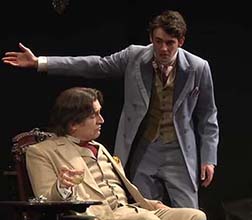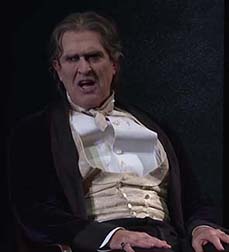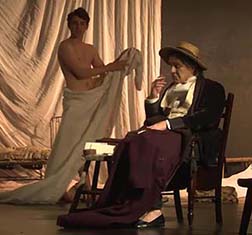
Lucy Komisar
| “The Judas
Kiss.” “The Judas Kiss.” Surprise that a play about a famous homosexual starts with a man and woman cavorting in bed. We see them waist up, she is nude. But we discover that they are just hotel servants, not the main attraction, who is gay and upper class in his tastes.
That’s Oscar Wilde, the playwright whose sense of entitlement probably helped blind him to the dangers of challenging the British upper class hypocrisy that, riven with homosexuality itself, just didn’t like it displayed so openly. Not in 1895. So, in some ways, David Hare’s very strong play is as much about class as about sexual choice. Class, of course, plays a role in other Hare plays. They are in the Cadogan Hotel in upscale Knightsbridge. Arthur (Elliot Balchin), a hotel worker, picks up food left in other rooms. It’s how he gets to eat crab. Wilde (Rupert Everett) sits down to a sumptuous lunch of lobster and wine. Everett is sumptuous as Wilde.
Lord Alfred Douglas, known as Bosie (Charlie Rowe), Wilde’s young lover, is aristocratic even when ordering water. Rowe plays him as guaranteed to infuriate anyone not besotted with him. He tells Wilde, “Do not confuse your life with your art.” Another friend, a former lover, the too mild-mannered Robert Ross, urges him to flee to escape impending prosecution for “indecency.” Director Neil Armfield makes you feel that you inhabit their lives as well as their rooms. Wilde’s wife (yes, he had one) has also implored him to flee England, to go to the continent, to Paris. Bosie wants him to stay and fight. Easy to say. Bosie has escaped prosecution because he is a lord. He of course is the Judas.
Wilde’s stubbornness leavened by wit asserts that the British hate him because he is Irish. And that there’s no way to change what will happen. He is defiant and cynical at the same time: “I am cast in a role. The story has been written. I am trapped in a narrative towards my disgrace.” And, “This is England. There is always a hanging.” And “the neck is my own.” The back and forth about go and stay goes on too long. The script passes over Wilde’s two years in prison, and we meet him again in a downscale Naples house (not a villa!) rented by Boise. In an ironic replay of the first opening seen, Bosie is in bed with a naked Italian fisherman, Galileo (Tom Colley), who prances around nude for most of his time on stage. Colley speaks excellent Italian in the various short speeches he is given.
Bosie is there for a while, but will soon depart. His own interests take precedence. Now Wilde has no money and certainly no servants. He is weary in body and spirit, though he still manages to wear black patent shoes. Everett is excellent in making clear the distinction between Wilde’s brilliance as a writer and foolishness and arrogance as a man.
|
| museums | NYTW mail | recordings | coupons | publications | classified |




